Is JSX Hop-On Jet Service Worth the Cost?
If you like luxury travel experiences, JSX could be worth the extra cost for a semi-private flight.
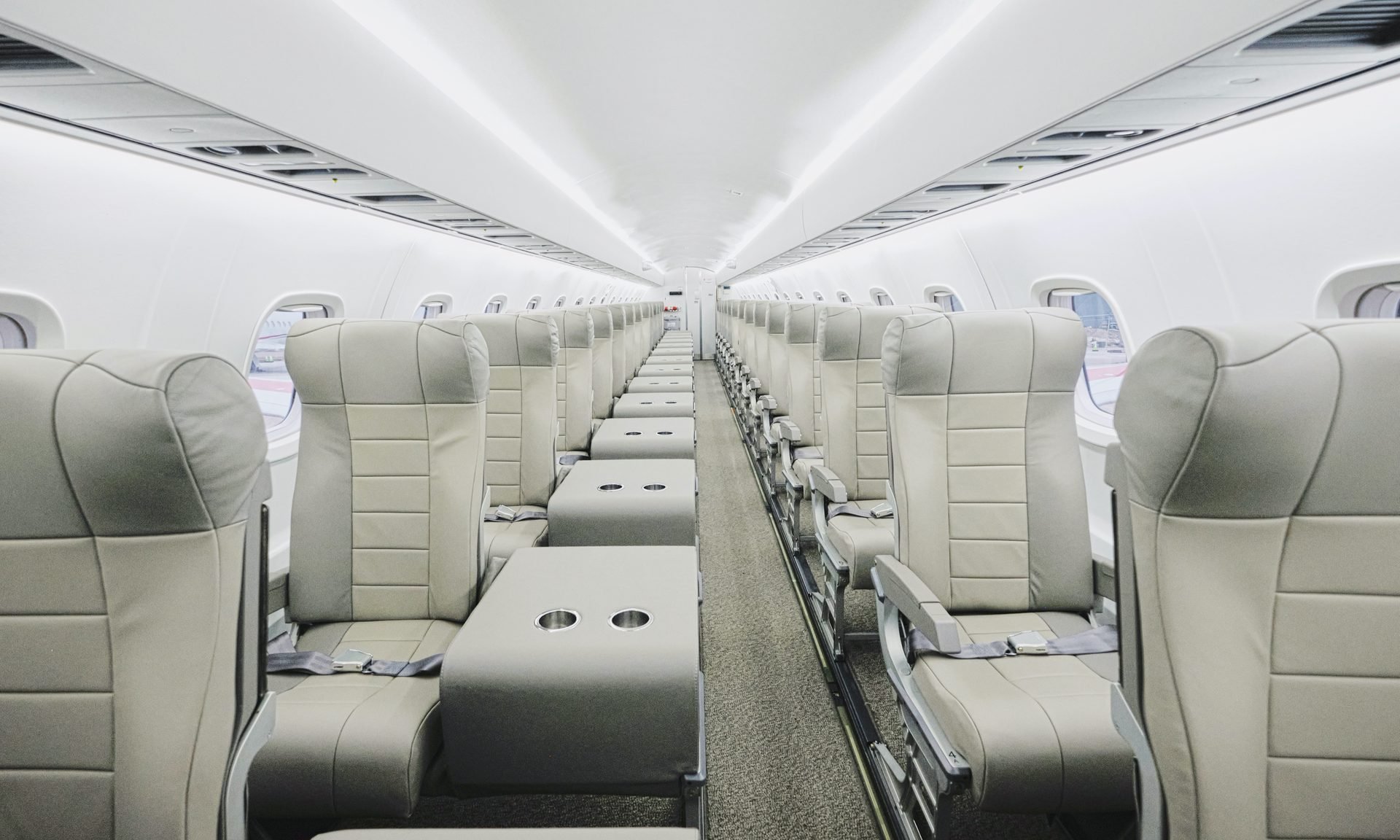
Many or all of the products on this page are from partners who compensate us when you click to or take an action on their website, but this does not influence our evaluations or ratings. Our opinions are our own.
Semi-private air travel has become increasingly accessible in recent years, and JSX is one of the air carriers leading the charge.
The public charter service operates 30-seat aircraft with business-class legroom, private terminals, and a 20-minute check-in process — positioning itself as a middle ground between commercial airlines and traditional private jets. The question for travelers: does the premium experience justify prices that can run two to three times higher than commercial flights?
Tickets start at $149 each way for shorter routes, though comparable flights on budget carriers like Southwest might cost just $49. Here's what distinguishes the JSX experience from conventional air travel.
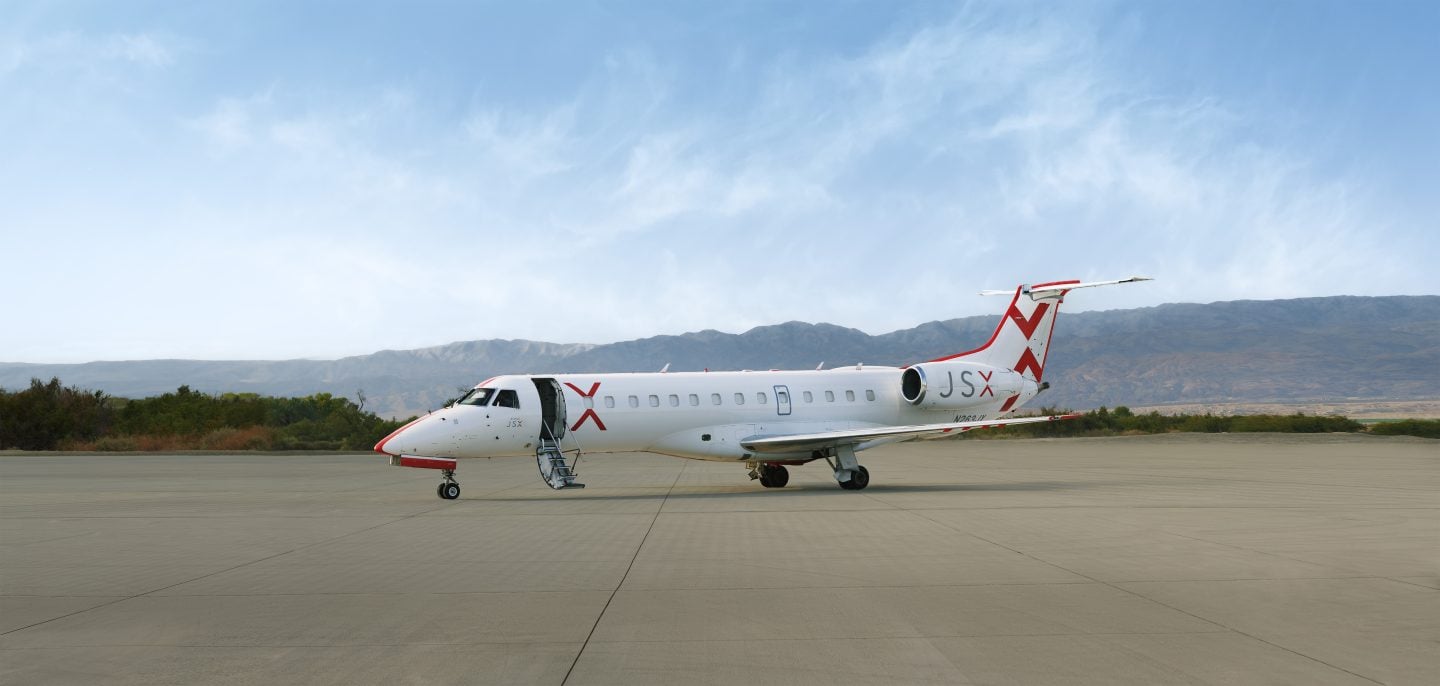
What is JSX?
JSX operates as a public charter service, offering what it calls "semi-private" flights. Passengers board through dedicated private terminals, bypassing the lengthy security lines and gate waits typical of commercial airports. The service allows check-in as late as 20 minutes before departure for domestic flights.
The fleet consists of 30-seat aircraft configured with business-class legroom, complimentary drinks and snacks and no middle seats. It's a streamlined alternative to traditional airlines, though whether it's worth the premium depends largely on individual travel priorities and flexibility.
Get the 'Cheat Codes' to Cheaper Travel
Unlocking the secret to saving a ton on travel is easier than you think. 📤 Our free newsletter shows you how in 5 min. or less.

JSX Wi-Fi options
JSX provides complimentary Starlink Wi-Fi on most flights. The connection process requires only selecting the network name — no credit card information, loyalty numbers or pre-roll advertisements necessary.
The carrier's ATR 42-600 turboprop aircraft are scheduled to receive Starlink during the first quarter of 2026.
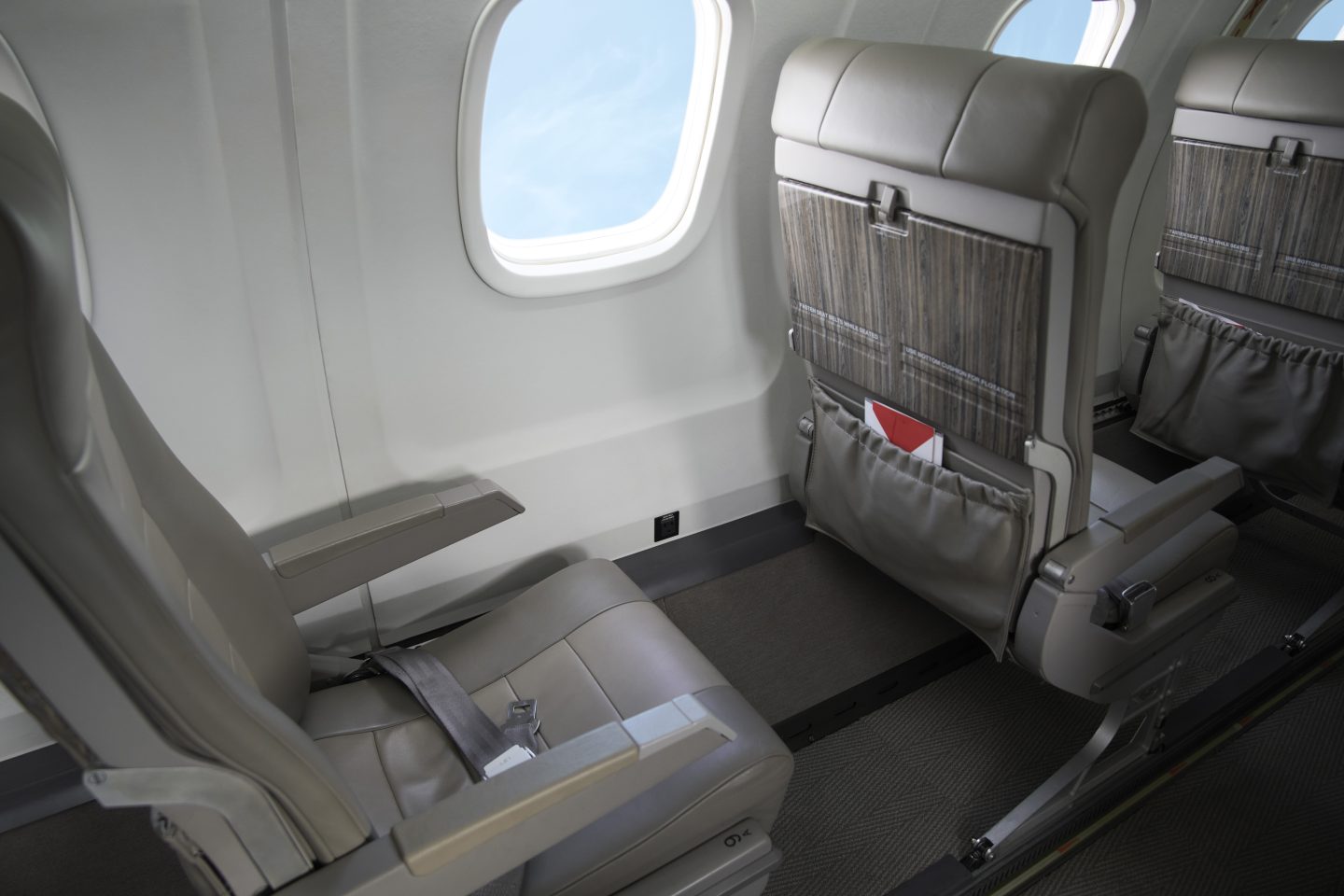
Where does JSX fly?
While JSX has grown to serve routes across roughly four dozen key North American markets, JSX flight routes are still limited. Among the airports served by JSX are:
- Austin, Texas (EDC).
- Burbank, California (BUR).
- Cabo San Lucas, Mexico (CSL).
- Concord / Napa, California (CCR).
- Dallas, Texas (DAL).
- Denver / Boulder, Colorado (BJC).
- Destin, Florida (DSI).
- Gunnison / Crested Butte, Colorado (GUC).
- Hobbs, NM (HOB).
- Houston, Texas (HOU).
- Las Vegas, Nevada (LAS).
- Los Angeles, California (LAX).
- Monterey / Carmel, California (MRY).
- Oakland, California (OAK).
- Orange County / Santa Ana, California (SNA).
- Santa Monica, California (SMO).
- Scottsdale, Arizona (SCF).
- Reno-Tahoe, Nevada (RNO).
- Taos, New Mexico (TSM).
- Westchester County, New York (HPN).
The majority of these routes are based in California and there are also some seasonal flights offered. Most JSX flights are nonstop routes, making the flight experience quicker and more enjoyable.
JSX routes
The JSX route map is constantly changing. Check out the Where We Fly page for the latest JSX destinations.
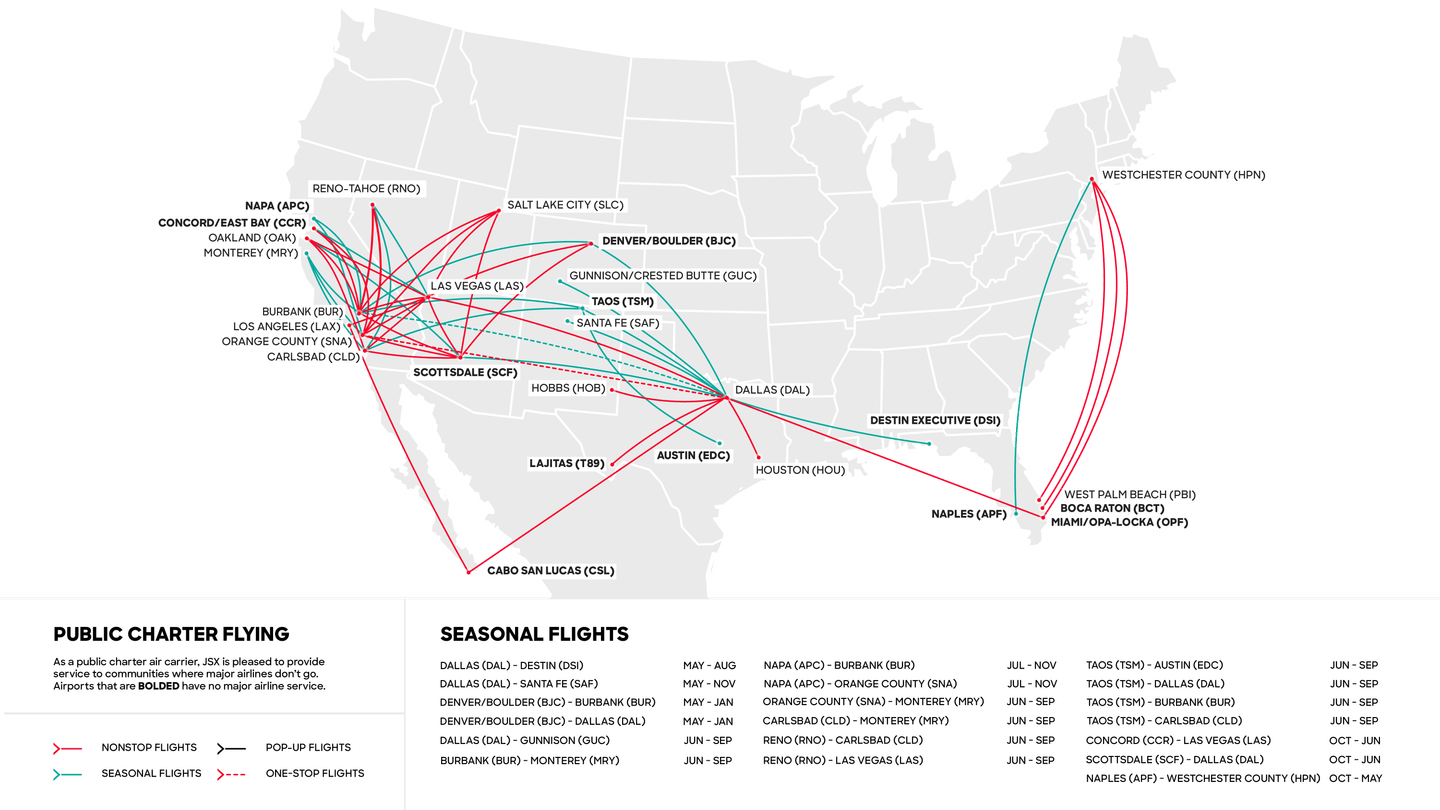
How to book a JSX flight
To book a flight on JSX, head over to jsx.com and click on the word “Book” in the top menu bar.
Select if you’re looking for a one-way or a round-trip flight and enter your flight details. Then click on “Find flights” to see the options available. On the next page, you’ll be able to see a list of available Hop On and All In fares for a seven-day period.
Select the fare you’re interested in by clicking the little red arrow next to the ticket price to pay for your flight.
Types of JSX tickets
When booking flights on JSX, there are two ticket types to choose from: Hop On and All In.
Hop On tickets
JSX Hop On tickets are the cheaper option. Although they are nonrefundable, if you cancel your flight you will receive a future flight credit (minus a $50 cancellation or change fee) Advanced seat selection also has a fee ($10 to $30 each way). Passenger fares include two checked bags, up to 50 pounds each.
All In tickets
The more expensive tickets are called All In. If you need to cancel your ticket, you will receive a refund to your original payment method. You can select your seat at no additional cost and there are no fees for changes or cancellations, and you are allowed three checked bags up to 50 pounds each.
Earn rewards points through JetBlue and United
You can earn JetBlue and United miles when booking JSX flights. Customers purchasing JSX All In fares will earn 250 TrueBlue points, whereas those with JSX Hop on fares will earn 150 points.
For United MileagePlus, your earn rate depends on your ticket number. For tickets that don’t start with 016, you'll earn 50% of miles flown in fare classes N, H, and P; 75% of miles flown for fare classes W, G and Q; and 100% of miles flown for fare classes Y, B, E, M, V, S, D and T.
For ticket numbers that start with 016, United passengers earn award miles based on their fare and MileagePlus elite status level:
- MileagePlus Member: 5x miles.
- Premier Silver: 7x miles.
- Premier Gold: 8x miles.
- Premier Platinum: 9x miles.
- Premier 1K: 11x miles.
Unfortunately, you cannot redeem United or JetBlue miles on JSX flights.
What does a JSX private jet cost?
There is a lot of competition for airfare, so are these JSX deals competitive with commercial operators like American or Southwest? To compare pricing, here are a few examples showing the JSX flight cost:
Westchester to Miami
Our example search of a round-trip flight from Westchester to Miami-Opa Locka was $1,798 for a Hop On fare or $2,598 for an All In fare.
Flying on American Airlines, this same trip would cost $509 for a main cabin ticket or $1,009 for a first class ticket.
Again, the price of the commercial airline ticket is significantly cheaper than flying semi-private with JSX. If you were planning on splurging for first class with American Airlines for $1,009, that would still be nearly half the cost of the $1,798 Hop On fare with JSX.
Unless you're able to find attractive JSX deals, you should probably bank on paying nearly double for the semi-private flight experience.
When JSX might especially make sense
If you can take advantage of JSX AmEx Offers
In the past, AmEx Offers have included discounts on JSX flights. A recent discount provided a $100 cash back statement credit after spending $200 or more on a flight. If you’re planning on flying with JSX, keep a lookout for AmEx offers. Enrollment required.
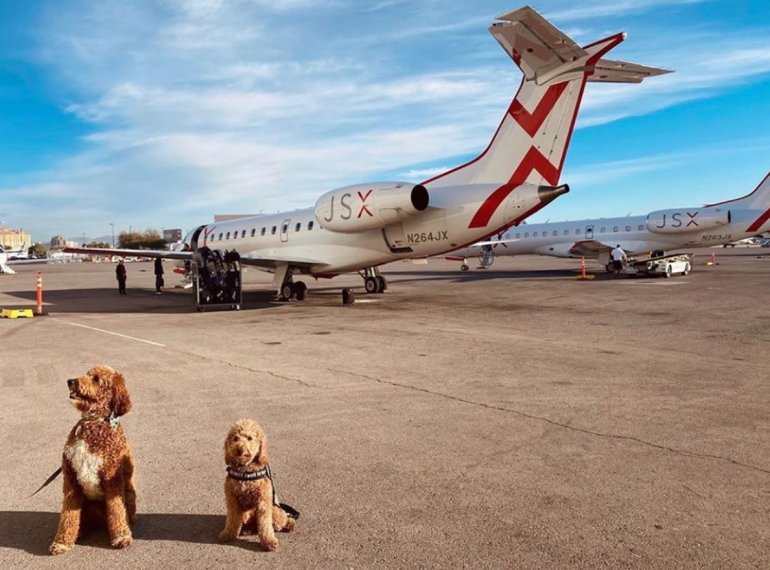
If you're flying with a pet
JSX allows cats and dogs onboard for $100 per one-way flight. The service could prove cost-effective if commercial airline pet fees would significantly increase your ticket price. Additionally, pets bypass TSA screening when flying JSX.
So, is JSX worth it?
Flying JSX might be worth the price but it largely depends on the type of traveler you are. Do you pay for upgrades and other fees anyway? Is the destination you’re headed to cheaper on a commercial airline? If you’re someone who enjoys luxury travel experiences, or would like to treat yourself to a semi-private flight with fewer passengers, the additional cost of JSX could be worth the investment. With up to three free checked bags and a faster check-in process, flying JSX can elevate your travel experience and make it run smoother.
But since JSX can also often turn out much more expensive (especially for folk used to basic economy), it isn't for everyone. There are more cost-effective options available, and its flight network is fairly limited anyway.
Even high-end travelers who already hold co-branded airline credit cards or who already hold airline elite status might find that the benefits they have access to — like lounge access, free checked bags and priority boarding — make commercial airlines better anyway.
(Top image courtesy of JSX)
How to maximize your rewards
You want a travel credit card that prioritizes what’s important to you. Here are some of the best travel credit cards of 2026:
- Flexibility, point transfers and a large bonus: Chase Sapphire Preferred® Card
- No annual fee: Wells Fargo Autograph® Card
- Flat-rate travel rewards: Capital One Venture Rewards Credit Card
- Bonus travel rewards and high-end perks: Chase Sapphire Reserve®
- Luxury perks: American Express Platinum Card®
- Business travelers: Ink Business Preferred® Credit Card
Article sources
NerdWallet writers are subject matter authorities who use primary,
trustworthy sources to inform their work, including peer-reviewed
studies, government websites, academic research and interviews with
industry experts. All content is fact-checked for accuracy, timeliness
and relevance. You can learn more about NerdWallet's high
standards for journalism by reading our
editorial guidelines.
Limited Time Only: Earn $1,000 Toward Travel!
Capital One Venture Rewards Credit Card 
Travel

For a limited time, the
Capital One Venture Rewards Credit Card is offering new cardholders an especially rich bonus: Enjoy $250 to use on Capital One Travel in your first cardholder year, plus earn 75,000 bonus miles once you spend $4,000 on purchases within the first 3 months from account opening - that’s equal to $1,000 in travel!
More like this
Related articles







